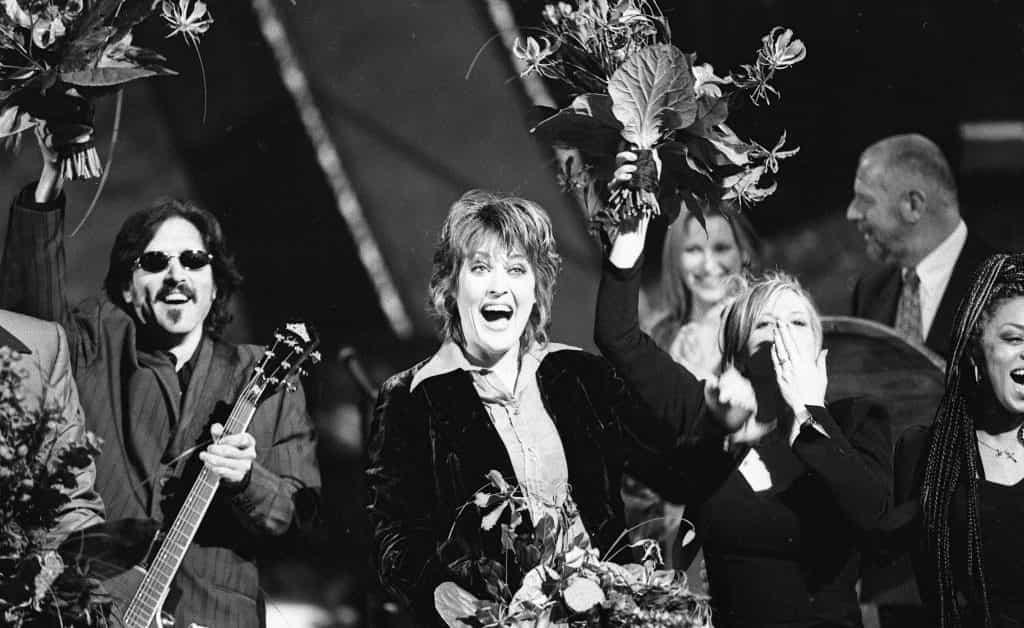The Eurovision Song Contest’s Biggest Success Stories
The Eurovision Song Contest began life in 1956. Just seven countries contested the first competition held in Lugano, Switzerland. On this occasion, for the only time, representatives from each country performed two songs. The host nation was the first Eurovision winner.
Now recognized as one of the longest-running television programs in the world – and among its most watched non-sporting events – Eurovision has changed and developed exponentially during the past five decades.

Katrina and The Waves winning the Eurovision Song Contest at The Point Depot, Dublin, 02/05/1997. (Photo by Independent News and Media/Getty Images)
Staged annually since its inception (Covid-19 did lead to the cancellation of the 2020 event), over 1,600 songs representing 52 countries have been performed on the Eurovision stage. Bizarrely, Morocco and more recently Australia, are amongst the countries that have, or still do, crash this European party. With 2023’s Eurovision song contest due to be held on 13th May in Liverpool, betting on Eurovision is bound to be a hot topic over the next few weeks.
But, forgetting the growth and changes to the event – most notably the voting systems, language criteria, the introduction of semi-finals that created a three-day Eurovision festival in 2004, et-al – the list of Eurovision winners shows the event is a launch pad for artists. Abba, Eurovision winners in 1974, are its biggest beneficiaries.
Who Are the Most Successful Eurovision Nations?
Topping the list of Eurovision winners is Ireland. The Emerald Isle made its Eurovision debut in 1965 and has won the contest seven times. The small island nation has also finished as runner-up four times. Irish Eurovision winners were commonplace in the early 1990s, and the country enjoyed success four times during a golden five-year spell. However, Ireland has not finished in the top five in any year since 1998.
Swedish Eurovision winners have also been plentiful. The Scandinavian country captured the prize in the 1970s, 1980s, 1990s, and 2010s, winning six times in total. With an additional seven top-three finishes and a total of 26 top-five results, it could be argued Sweden can be considered the most successful Eurovision Song Contest contestants of all time.
With five wins apiece, four countries share the third spot on the list of Eurovision Song Contest winners: Luxembourg, France, Netherlands, and the UK. Luxembourg’s achievements stand out as the small landlocked country has not contested the competition since 1993.
Eurovision Previous Winners
We’ve compiled a list of every previous Eurovision winner dating back to the very first song contest back in 1956, so if you want to know who won in a particular year, check out the table below:
| Previous Eurovision Winners | |||
|---|---|---|---|
| Year | Winning Country | Artist | Song |
| 1956 | Switzerland | Lys Assia | Refrain |
| 1957 | Netherlands | Corry Brokken | Net als toen |
| 1958 | France | André Claveau | Dors, mon amour |
| 1959 | Netherlands | Teddy Scholten | Een Beetje |
| 1960 | France | Jacqueline Boyer | Tom Pillibi |
| 1961 | Luxembourg | Jean-Claude Pascal | Nous les amoureux |
| 1962 | France | Isabelle Aubret | Un premier amour |
| 1963 | Denmark | Grethe and Jørgen Ingmann | Dansevise |
| 1964 | Italy | Gigliola Cinquetti | Non ho l’étà |
| 1965 | Luxembourg | France Gall | Poupée de cire, poupée de son |
| 1966 | Austria | Udo Jürgens | Merci, Chérie |
| 1967 | United Kingdom | Sandie Shaw | Puppet on a String |
| 1968 | Spain | Massiel | La,la,la |
| 1969 | Spain | Salomé | Vivo cantando |
| 1969 | United Kingdom | Lulu | Boom Bang-a-Bang |
| 1969 | France | Frida Boccara | Un jour, un enfant |
| 1969 | Netherlands | Lenny Kuhr | De Troubadour |
| 1970 | Ireland | Dana | All Kinds of Everything |
| 1971 | Monaco | Séverine | Un banc, un arbre, une rue |
| 1972 | Luxembourg | Vicky Leandros | Après toi |
| 1973 | Luxembourg | Anne-Marie David | Tu te reconnaîtras |
| 1974 | Sweden | ABBA | Waterloo |
| 1975 | Netherlands | Teach-In | Ding-a-dong |
| 1976 | United Kingdom | Brotherhood of Man | Save Your Kisses for Me |
| 1977 | France | Marie Myriam | L’oiseau et l’enfant |
| 1978 | Israel | Izhar COhen and the Alphabeta | A-Ba-Ni-Bi |
| 1979 | Israel | Gali Atari and Milk and Honey | Hallelujah |
| 1980 | Ireland | Johnny Logan | What’s Another Year |
| 1981 | United Kingdom | Bucks Fizz | Making Your Mind Up |
| 1982 | Germany | Nicole | Ein bißchen Frieden |
| 1983 | Luxembourg | Corinne Hermès | Si la vie est cadeau |
| 1984 | Sweden | Herreys | Diggi-Loo Diggi-Ley |
| 1985 | Norway | Boddysocks! | La det swinge |
| 1986 | Belgium | Sandra Kim | J’aime la vie |
| 1987 | Ireland | Johnny Logan | Hold Me Now |
| 1988 | Switzerland | Céline Dion | Ne partez pas sans moi |
| 1989 | Yugoslavia | Riva | Rock Me |
| 1990 | Italy | Toto Cutugno | Insieme: 1992 |
| 1991 | Sweden | Carola | Fångad av en stormvind |
| 1992 | Ireland | Linda Martin | Why Me? |
| 1993 | Ireland | Niamh Kavanagh | In Your Eyed |
| 1994 | Ireland | Paul Harrington and Charlie McGettigan | Rock ‘n’ Roll Kids |
| 1995 | Norway | Secret Garden | Nocturne |
| 1996 | Ireland | Eimear Quinn | The Voice |
| 1997 | United Kingdom | Kathrina & The Waves | Love Shine a Light |
| 1998 | Israel | Dana International | Diva |
| 1999 | Sweden | Charlotte Nilsson | Take Me to Your Heaven |
| 2000 | Denmark | Olsen Brothers | Fly on the Wings of Love |
| 2001 | Estonia | Tanel Padar, Dave Benton and 2XL | Everybody |
| 2002 | Latvia | Marie N | I Wanna |
| 2003 | Turkey | Sertab Erener | Everyway That I Can |
| 2004 | Ukraine | Ruslana | Wild Dances |
| 2005 | Greece | Helena Paparizou | My Number One |
| 2006 | Finland | Lordi | Hard Rock Hallelujah |
| 2007 | Serbia | Marija Šerifović | Molitva |
| 2008 | Russia | Dima Bilan | Believe |
| 2009 | Norway | Alexander Rybak | Fairytale |
| 2010 | Germany | Lena | Satellite |
| 2011 | Azerbaijan | Ell&Nikki | Running Scared |
| 2012 | Sweden | Loreen | Euphoria |
| 2013 | Denmark | Emmelie de Forest | Only Teardrops |
| 2014 | Austria | Conchita Wurst | Rise Like a Phoenix |
| 2015 | Sweden | Måns Zelmerlöw | Heroes |
| 2016 | Ukraine | Jamala | 1944 |
| 2017 | Portugal | Salvador Sobral | Amar pelos dois |
| 2018 | Israel | Netta Barzilai | Toy |
| 2019 | The Netherlands | Duncan Laurence | Arcade |
| 2021 | Italy | Maneskin | Zitti e buoni |
| 2022 | Ukraine | Kalush Orchestra | Stefania |
The Four 1969 Eurovision Winners
It could be argued France, Netherlands, and the UK have only taken the prize four-and-a-quarter times as all three – plus Spain – were declared 1969 Eurovision winners following a controversial four-way tie in Madrid. It is the only time the Eurovision Song Contest has been declared a tie.
UK Eurovision winners are no longer common. British Eurovision winners Katrina and the Waves – performing ‘Love Shine a Light’ – were the last act to stand on the winner’s rostrum when clearcut winners in 1997. However, the nation has finished second 16 times, most recently in 2022.
1988 was a near miss for the Brits when the final scores saw Switzerland declared the Eurovision winners by a single point ahead of Scotsman Scott Fitzgerald singing ‘Go’. Interestingly, Fitzgerald was the first-ever artist chosen by telephone vote to sing the UK’s entry in the Eurovision Song Contest. His song was written and composed by Julie Forsyth – the daughter of the entertainer Sir Bruce Forsyth – she performed backing vocals on stage.
But ‘Go’ only reached number 52 on the UK charts, and Scott Fitzgerald’s career quickly fizzled out. That is not the case for the winning act. This was the year that Eurovision launched the career of one of the world’s biggest stars. Who was it? Read on, as all will be revealed.
Five of Eurovision’s Biggest Success Stories
5. Grease Star Shone Bright in Brighton
Four years before Olivia Newton-John starred in ‘Grease’ – one of the highest-grossing musical films of all time with a soundtrack that is one of the world’s best-selling albums – the English-born and Australian-reared star represented the UK at the Eurovision Song Contest.
The Eurovision winner this year, Abba, was a tough nut to crack in the 18-act field. But the then 26-year-old Newton-John garnered enough points to finish joint-fourth. Admittedly she was already a certified star with a top-10 U.S. hit and a Grammy to her credit. However, the Eurovision Song Contest introduced the artist to a whole new audience, and she grasped the opportunity with open arms.
Olivia Newton-John died in 2022 after a long illness. During her shortened and punctuated career, she sold 100 million records and performed for millions of people. But she may best be remembered as an advocate and sponsor for breast cancer research and an activist for environmental and animal rights causes.
4. 1958 Third Is a Eurovision Winner
Eurovision 2021 winners Måneskin has put Italian glam rock on the world map. The four-piece band has been well-received in the United States, and record sales can already be counted in the tens of millions.
But it is unlikely the rockers will replicate the amazing success of Italy’s 1958 Eurovision song, ‘Nel blu, dipinto di blu’ (also known as Volare) performed by Domenico Modugno. It finished only third of ten acts, but it would go on to spend five weeks at the top of the U.S. Billboard Hot 100.
The tune subsequently received the ‘Record of the Year’ and ‘Song of the Year’ awards at the 1959 Grammys and sold almost 20 million copies. ‘Nel blu, dipinto di blu’ subsequently became the most covered Eurovision song of all time. Versions have been recorded by Dean Martin, Cliff Richard, David Bowie, and many other established stars.
3. 1970 A Springboard for Julio Iglesias
Spain’s Julio Iglesias was only two years into his career when chosen to represent his country at the 1970 Eurovision Song Contest. His song, ‘Gwendolyne’, finished fourth on the night but hit the top spot in Spain’s singles chart and was later recorded in five languages.
Records – not the musical variety – have been smashed by Iglesias ever since. The Spaniard has recorded songs in more languages than any other artist. He is the highest-selling Latin music artist worldwide, and it is estimated he has performed over 5,000 shows to entertain over 60 million people.
2. 1988 Celine Go, Go On
The irony …a song called ‘Go’ failed to make the UK Eurovision winners by a single point, and its conqueror, Celine Dion representing Switzerland, later enjoyed titanic worldwide fame and adulation with a song called ‘My Heart Will Go On’!
Few could have predicted the success that 1988 Eurovision winner Celine Dion would enjoy in years to come. At the time, many were disappointed that a Canadian was allowed to carry a Swiss flag into a Eurovision battle. But Switzerland has always had an identity crisis, and songs performed in English, Italian, German, French, and even Romansh have represented the country in the past.
At Eurovision, 20-year-old Dion sang ‘Ne partez pas sans moi’ in French. It made a superstar of the youngster who had achieved stardom in Quebec but was little known outside of any French-speaking territory.
Dion is now regarded as one of the greatest female singers and is one of the best-selling music artists of all time. Her worldwide record sales are estimated to be 250 million. They derive from 27 studio albums, 19 compilation albums, and 25 box sets. Dion’s net worth is thought to be $800 million.
1. Abba Took It All in 1974
It took 18 years, but in 1974 Abba became the first group to win the Eurovision Song Contest. The biggest act since the Beatles, the Swedish band landed the contest with ‘Waterloo’ – a song that would sell five million copies to become one of Eurovision’s most successful winning songs.
Abba’s win in Eurovision propelled the unknown Scandinavian group into superstardom, and before their 1983 split, the quartet obliged by producing smash hit after smash hit. The hit factory slipped into top gear in 1975 with Mamma Mia and S.O.S. Money Money Money, Dancing Queen, and Fernando followed in 1976.
Such was Abba’s popularity and longevity (the Abba star still shines bright today), in 2000 – 17 years after they disbanded – the band turned down a $1 billion offer to perform a series of 100 shows.
Today Abba’s total record sales are estimated to be 380 million. The figure is boosted by ‘Abba Gold’ the greatest hits record that has been called “one of the most influential compilation albums ever released.”
Spending over 1,000 weeks on the UK’s Albums Chart – including 61 weeks in the top 10 and reaching the top spot five times (eight weeks in total) – ‘Abba Gold’ contributes 30 million sales to Abba’s phenomenal tally.



